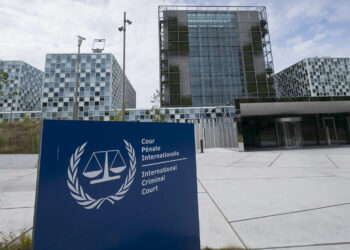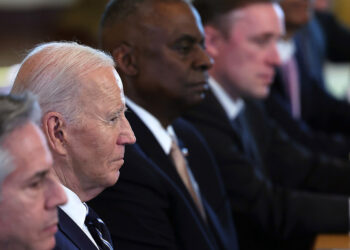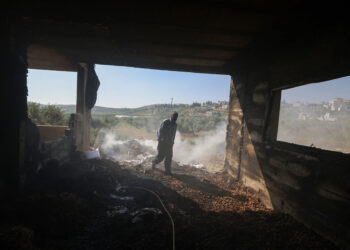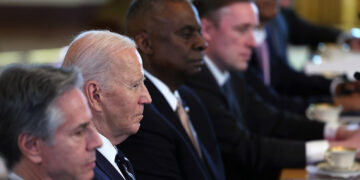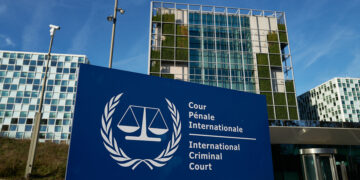Deadline Imminent for President's Review of 12 Death Penalty Verdicts in Politicized Prosecution
عربي
(Washington D.C., June 24, 2021): The Egypt Court of Cassation's June 14 verdict upholding the death penalty for 12 defendants, life imprisonment for 31, and varying sentences for hundreds of others for their alleged participation in the 2013 Rabaa Square protests against President Sisi's military coup failed to meet minimum standards of due process, fairness, or justice, Democracy for the Arab World Now (DAWN) said today.
An examination of the backgrounds of the men sentenced to death and the purported charges and evidence against them suggests the trial is a means to provide judicial cover for the military government's goals of eliminating the Muslim Brotherhood's leadership and terrorizing Egyptians who continue to oppose the government. Egypt's Criminal Procedure Law gives President Sisi 14 days from the date he formally receives notice of the verdict to pardon the defendants or commute their sentences to stop the executions from going forward. If no action is taken, the sentences will be carried out.
"A close examination of the facts makes clear that this case had nothing to do with actual crimes and everything to do with the Egyptian government's revenge against the Muslim Brotherhood leadership for resisting his military coup in 2013," said Sarah Leah Whitson, Executive Director of DAWN. "As if Sisi's rule of terror over the past eight years was not enough — replete with mass killings of protesters, mass arrests, mass torture, and mass repression — Sisi is now sharpening his judicial blade to execute the country's imprisoned opposition leaders and ensure no revolution against Egypt's dictatorship ever recurs."
The Cairo Criminal Terrorism Court commenced its trial of the "Dispersal of the Rabaa Al-Adawiya Sit-in Case" (the "Rabaa Case") in late 2015, following mass arrests of at least 800 Egyptians, most of whom had participated in a sit-in in Rabaa Square to protest President Sisi's military coup on July 3, 2013. In a premeditated plan to violently end the sit-in, government security forces attacked the over 85,000 protesters assembled at Rabaa Square and massacred at least 1,036 protesters, including women and children, on August 14, 2013. Eight police were killed at the protest. The massacres at Rabaa Square and five other protests in July and August 2013 were widely condemned by the United Nations and global human rights organizations as a crime against humanity for their systematic and widespread killings of protesters.
Although the Sisi government promised to investigate the massacre, which by the government's own count included 627 victims, no investigation was ever conducted, and not a single security officer was investigated or tried for the massacre.
In 2018, the criminal court, headed by Judge Hassan Farid el-Shami, sentenced 75 of the defendants to death, 47 to life imprisonment, 374 to 15 years imprisonment, 22 to 10 years imprisonment, and 215 to five years imprisonment in a trial that did not meet fair trial standards. The defendants were deprived of the right to adequate counsel with rare and limited meetings with their lawyers.
The generalized charges against each of the defendants were almost entirely the same, including illegally protesting, forming an illegal gang that attacked residents near Rabaa Square, vandalizing public property, resisting arrest, killing individuals and policemen, violence, and possession of explosive materials and firearms.
Prosecutors did not make public any evidence of the individual culpability of the defendants for their alleged violent crimes, and it is doubtful that evidence of such individual culpability exists. Many of the charges against the defendants are not cognizable as crimes under international human rights law.
Some defendants, including some of those sentenced to death, were not even present at the protests. In all circumstances, participating in a protest is a basic human right and should not be punishable as a crime, certainly not with the death penalty or life imprisonment.
"Rather than prosecuting the officials — including President Sisi and former prime minister Hazem Beblawy — who organized this massacre, the Egyptian judiciary has grotesquely prosecuted the protesters themselves, and now plans to execute senior leaders of the Muslim Brotherhood," said Whitson. "The purpose of this verdict is crystal clear: Egyptians are being put on notice that any efforts for democracy or protests against the military government will be punishable by death."
DAWN's examination of the backgrounds of the defendants sentenced to death and the available court record of the proceedings against them, detailed below, shows that either no evidence or no specific, individualized evidence has been made available to support the generalized charges against them. Moreover, of the 12 sentenced to death, it appears that four of the defendants were not even present at the Rabaa sit-in. The 12 sentenced to death include five medical doctors, two religious scholars, two engineers, a computer scientist, an accountant, and a lawyer.
Cassation Court judges whose identities have not been disclosed presided over the appeal. Prosecutor Mohamed Abdel Shafy, Public Attorney of the Eastern Cairo Prosecution, working under the authority of Prosecutor General Hamada El-Sawy, represented the government in its prosecution. DAWN has previously documented the role of El-Sawy in abusing the human rights of Egyptians, including his unlawful prosecution of thousands of Egyptians for their peaceful activism.
The verdict, in this case, was made public just days after Secretary Blinken visited Cairo for a meeting with President Sisi, reassuring him of America's "strong strategic partnership" with Egypt and President Biden's "commitment to this relationship," despite President Biden's earlier promises to reevaluate U.S. military support for the Egyptian government. Blinken's meeting with Sisi was pegged as an act of gratitude for Egypt's purported role in helping to negotiate a ceasefire between Hamas and Israel during the recent conflict in Israel/Palestine.
Of the $1.3 billion in arms pledged by the U.S. government to President Sisi, Congress suspended $75 million contingent on human rights reforms not subject to a national security waiver and $300 million contingent on reforms subject to the waiver. Abbas Kamel, Egypt's intelligence chief, represented by public relations firm Brownstein Hyatt Farber Schreck, met with Congressional officials in Washington this week in efforts to secure the waiver for the $300 million in suspended arms, relying on Egypt's importance to the recent ceasefire.
"Fashioning Egypt as important to regional security is a thin little fig leaf to justify continued arms sales to its military government in the face of relentless and severe abuses against the Egyptian people," said Whitson. "The message Sisi has taken from Blinken's reassurances of support is that he can do whatever he wants — including wantonly to execute jailed opposition figures."
Egypt ranks third in its use of the death penalty in the Middle East. In 2020, the Egyptian government executed at least 107 people and sentenced more than 264 to death.
DAWN urged President Sisi to suspend the verdicts in this unlawful trial before the 14-day deadline, end the use of the death penalty in Egypt, and pardon the defendants in the Rabaa Case.
DAWN called on the United States to end its military support for the Egyptian government, in keeping with the U.S.'s own obligations under the U.S. and international laws not to contribute to human rights abuses and not to provide arms to systematically abusive governments.
Background:
DAWN has gathered information about the backgrounds, charges, and purported evidence submitted against the 12 defendants subjected to death in case No. 34150 of 2015, Nasr City Felonies Court (1st District), known in the media as the "Dispersal of the Rabaa Al-Adawiya Sit-in Case" (the "Rabaa Case").
- Dr. Mohamed El-Beltagy, 52 years old, is a university professor, physician, and well-known Muslim Brotherhood politician. He was a Muslim Brotherhood Member of Egypt's Parliament from 2005 to 2010, served as a member of the Constituent Assembly to draft the post-revolution constitution, and served in the post-revolutionary parliament again from 2011 – 2012.
Dr. El-Beltagy attended the protest at Rabaa Square, along with his wife and children, including his 17-year-old daughter Asmaa El-Beltagy, whom Egyptian security officers killed during the massacre on August 14, 2013. He addressed the protesters during the sit-in from the central podium. Security forces detained El-Beltagy on August 29, 2013, and charged him with the same generalized charges brought against the other 738 defendants in the Rabaa trial. The government did not present any specific evidence to support the generalized charges against Dr. El-Beltagy.
- Dr. Osama Yassin, 51 years old, a physician, is a prominent Muslim Brotherhood leader and served as Minister of Youth in Hisham Qandil's Cabinet during the Morsi presidency. He served in the Egyptian parliament from 2011-12 and headed the Youth Committee. Dr. Yassin also served as a medical specialist and advisor in the pediatric unit of Ain Shams University Hospital from 1994 to 2010. He was a member of the World Allergy Organization and a founding member of the Egyptian Pediatric Allergy and Immunity Group.
Dr. Yassin attended the sit-in at Rabaa Square. He was a prominent leader who addressed the protesters from the central podium during the sit-in. Security forces detained Dr. Yassin on August 26, 2013 and charged him with the same generalized charges brought against the other 738 defendants in the Rabaa trial. However, the government did not present any specific evidence to support the generalized charges against him.
- Dr. Abdel Rahman El-Bar, 52 years old, was a university professor of Hadith at Al-Azhar University. He has published numerous books and articles. At Al-Azhar University, El-Bar served as the dean of the Faculty of Religion Fundamentals and supervised numerous students writing their master's and doctoral theses. El-Bar is a leading Muslim Brotherhood preacher and member of its Supreme Guidance Office. He was elected in 1995 as a member of the Board of Directors of the Association of Al-Azhar Scholars.
Dr. El-Bar participated in the Rabaa sit-in. He was a speaker at the Rabaa protests from the central podium. Security forces detained him on June 1, 2015 and charged him with the same generalized charges as the 738 other defendants in the mass trial against Rabaa Square protesters. The court presented no specific evidence to support the individual charges against Dr. El-Bar.
- Dr. Ahmed Aref, 35 years old, is a dentist. He was the Assistant Secretary General of the Dentists Syndicate before resigning to become a Spokesman for the Muslim Brotherhood.
Dr. Aref participated in the Rabaa protest. He addressed the protesters from the central podium. Security forces detained him on August 22, 2013 and charged him with the same generalized charges as the 738 other defendants in the mass trial against Rabaa Square protesters. The court presented no specific evidence to support the individual charges against Dr. Aref.
- Dr. Safwat Hegazy, 53 years old, is an Islamic preacher and former television host. He attended the Rabaa protest and regularly addressed the protesters from the sit-in stage. Security forces detained him on August 21, 2013 and charged him with the same generalized charges as the 738 other defendants in the mass trial against Rabaa Square protesters. The court presented no specific evidence to support any individual charges against Dr. Hegazy.
- Dr. Abdel Azim Ibrahim, 45 years old, is a medical doctor specializing in endocrinology and served as a director of Town Gas petroleum company. He was a member of the Muslim Brotherhood.
Security forces arrested him on July 24, 2013 at his workplace, several weeks before the Rabaa sit-in dispersal on August 14, 2013. He did not attend the Rabaa sit-in and was imprisoned at the time. According to witnesses who provided information to DAWN, security forces had arrived to arrest his colleague, Dr. Mohamed Zanati, for his role in the Rabaa protest when Dr. Ibrahim intervened to ask to see a warrant for Dr. Zanati's arrest. In response, police arrested him as well. He has been subject to extreme torture and extended periods of solitary confinement during his confinement, according to sources close to him.
Despite his lack of any connection with the Rabaa protests, prosecutors charged Dr. Ibrahim with the same generalized charges brought against the 738 other defendants in the Rabaa Case. The court presented no specific evidence to support any individual charges against Dr. Ibrahim.
- Dr. Mohamed Zanati, 34 years old, is a medical doctor who served as a director of Town Gas' medical affairs department. During the Rabaa sit-in, he directed the Rabaa Al-Adawiya sit-in field hospital, where he supervised doctors and nurses who treated hundreds of patients in need of medical care during the several weeks of the sit-in. At the time of the Rabaa massacre, the field hospital also treated hundreds of injured protesters whom Egyptian security forces had violently attacked, shot at, and injured.
Egyptian security forces arrested Dr. Zanati on July 24, 2013 at his workplace and charged him with the same generalized charges brought against the 738 other defendants in the Rabaa Case. The court presented no specific evidence to support any individual charges against Dr. Zanati.
- Ehab Wagdy Mohamed Afif, 30 years old, obtained his Bachelor's Degree in Computer Science in 2004 and worked as a computer science teacher. He attended the Rabaa Square sit-in.
Egyptian security forces arrested him and charged him with the same generalized charges brought against the 738 other defendants in the Rabaa Case. The court presented no specific evidence to support any individual charges against Mr. Afifi.
- Mohamed Abdel Hai Hussien El-Faramawi, 40 years old, is an accountant.
- Mostafa Abdel Hai Hussien El-Faramawi, 30 years old, is a computer engineer.
- Haitham Sayed El-Araby Mahmoud, 36 years old, is a civil engineer.
- Ahmed Farouk Kamel Mohamed, 36 years old, is a lawyer.
Egyptian security forces arrested these men at a security checkpoint in Cairo on July 15, 2013, a month before the August 14 dispersal of the Rabaa sit-in. Prosecutors initially accused the men of detaining and torturing Ahmed Hassan Mohsen, a car parker (case No. 3632/2013). A Cairo Criminal Court presided by judge Mohamed Amer Gadou sentenced them in this trial to three years in prison in 2014.
During the trial, Hassan confessed that the defendants never tortured him, but rather tried to help him following injuries he had sustained, and took him to a hospital for treatment. Hassan stated that a police officer, Omar Farouk, ordered him to fabricate allegations against them. Still, the judge refused to consider Hassan's confession that he provided false testimony against the men and sentenced the men anyway.
Prosecutors subsequently included the men in the Rabaa Case and charged them with the same generalized charges brought against the 738 other defendants in the case. The court presented no specific evidence to support any individual charges against the men.
Photo Credits: CAIRO, EGYPT – MARCH 6: Muslim Brotherhood Leader Mohamed Badie (R) and 47 other defendants stand behind bars during the trial of Brotherhood members at a courtroom on March 6, 2014 in Cairo, Egypt. A Cairo court on Thursday adjourned to March 11 the trial of Muslim Brotherhood leader Mohamed Badie and 47 other defendants charged with inciting violence in Egypt's Qalioubiya province last summer, judicial sources said. (Photo by Ahmed Jamil/Anadolu Agency/Getty Images)
, mea molestie sadipscing vituperatoribus ei.












